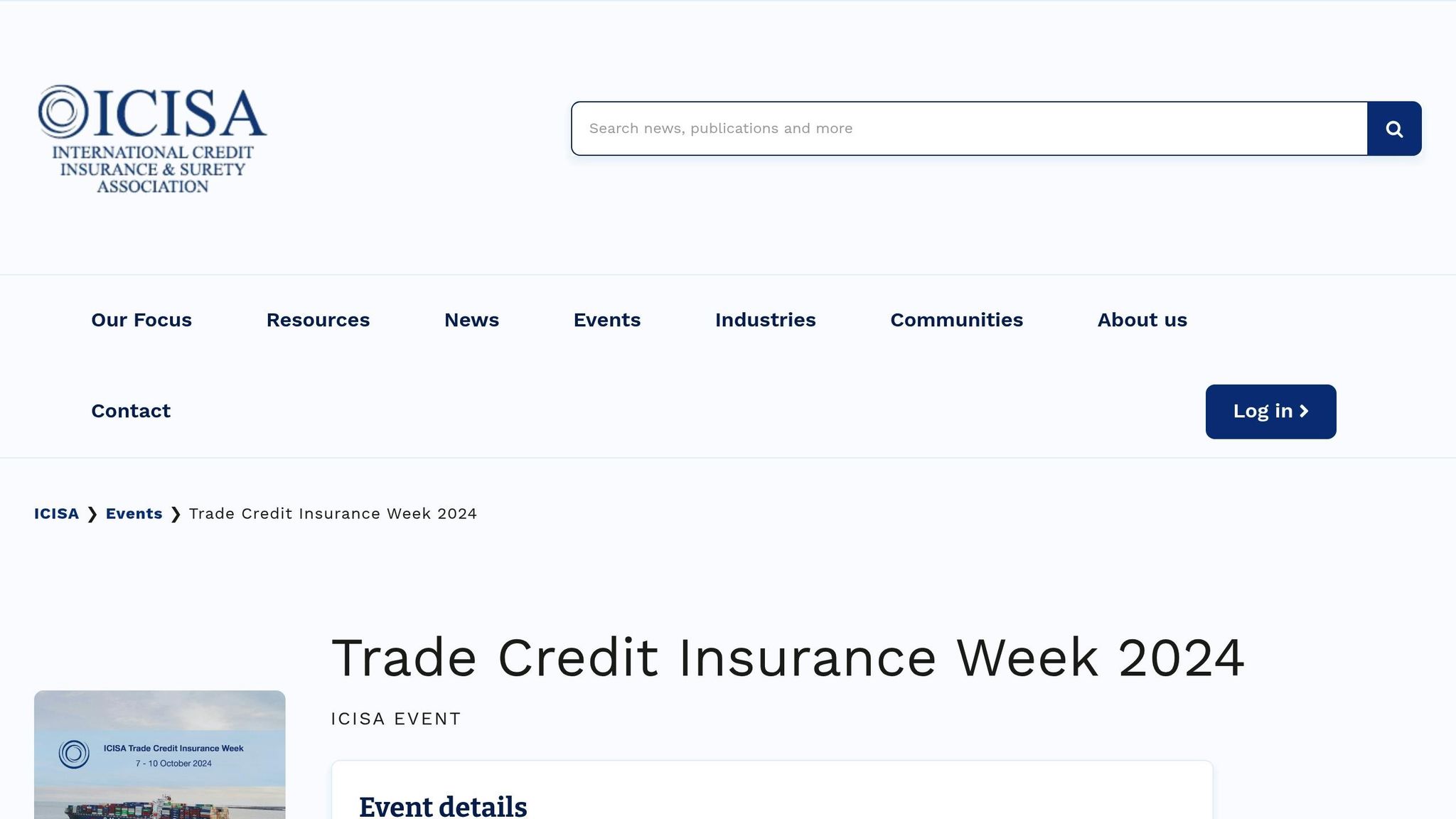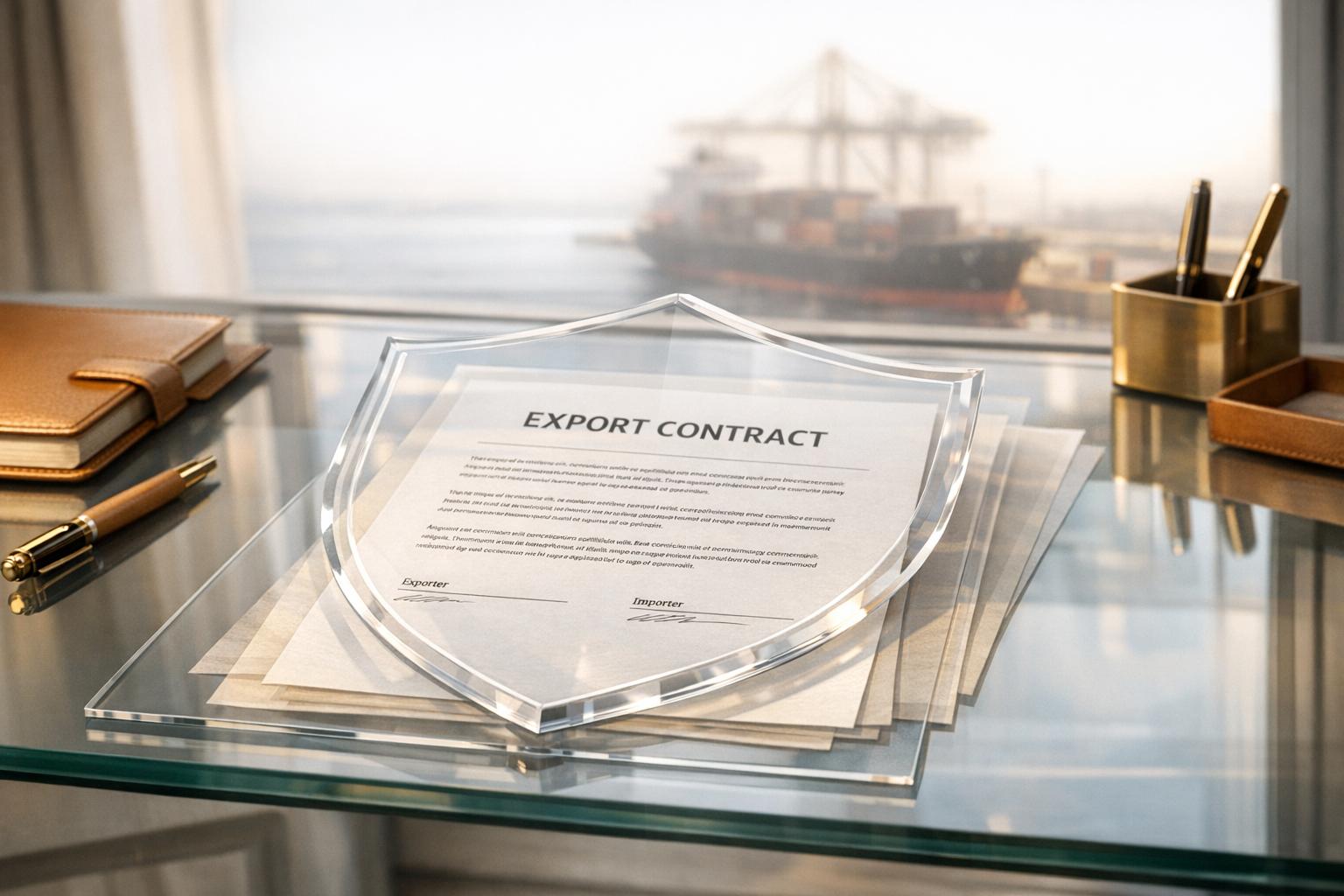Political risks are becoming a major concern for businesses involved in credit sales, as events like government interference, wars, sanctions, and civil unrest disrupt trade and payment flows. Trade credit insurance offers a way to safeguard businesses from these uncertainties by protecting accounts receivable and providing tools like credit assessments and claims management.
Key Takeaways:
- What It Does: Trade credit insurance protects businesses from non-payments due to customer insolvency, defaults, or political disruptions.
- Why It Matters: Political risks, including instability, tariffs, and sanctions, are rising globally, making it harder for businesses to maintain cash flow.
- Market Trends: Demand for trade credit insurance is growing, with the market projected to exceed $23.9 billion by 2032.
- Challenges: Securing coverage in high-risk regions like China, Israel, and Eastern Europe is becoming increasingly difficult.
- Benefits: Insured businesses can better manage risks, negotiate financing, and confidently operate in unstable markets.
Trade credit insurance not only reduces financial risks but also helps businesses adapt to shifting global trade dynamics. With political uncertainties on the rise, this tool is becoming essential for maintaining stability and growth.
TCI Week 2023 – Understanding the Re-emergence of Political Risk and its Implications
Study Findings on Political Risks in Trade Credit Insurance
Recent studies reveal that political risks are increasingly influencing the trade credit insurance market, with more business leaders identifying them as a major concern. These risks stem from both international and domestic challenges, reshaping how insurers and businesses approach coverage.
How Global Tensions Affect Trade Credit Insurance
Geopolitical conflicts and international tensions are causing noticeable shifts in the demand for trade credit insurance and claims patterns. According to recent data, 30% of business leaders worry that election outcomes could disrupt their global operations and trade capabilities. This concern has led to a growing reliance on risk transfer tools like trade credit insurance. Additionally, the perceived risks of war and terrorism have surged, climbing from 15% in 2021 to 25%.
Regional coverage availability has become highly uneven. For instance, securing political risk coverage in China has become nearly impossible due to escalating tensions with the U.S., while insurers are also scaling back in Taiwan, though to a lesser degree than in China. Meanwhile, demand for political risk insurance has surged in Eastern Europe amid fears of Russian aggression. In contrast, coverage remains scarce in Israel due to the ongoing Middle East conflict.
"Elections bring the uncertainty of a change in government. You might have a situation where a party that has campaigned on resource nationalization comes to power – which is not good for energy companies invested in that country."
– Roddy Barnett, Head of Political Risk & Trade Credit, Beazley
To address these challenges, insurers are refining their risk evaluation processes and compliance measures. They’re also developing more adaptable products to navigate the complexities of supply chains affected by sanctions and global tariffs.
Domestic Political Risks in the U.S.
While international tensions dominate global coverage strategies, domestic political issues are reshaping the U.S. insurance landscape. Political violence, including incidents linked to domestic divisions, has become a growing concern. The situation is compounded by economic pressures: U.S. business bankruptcies rose by 23.5% in 2025, tariffs reached levels not seen since the Great Depression, and the prime rate climbed to 7.5%.
These domestic challenges are prompting insurers to shift their focus toward covering risks in stable, developed economies rather than emerging markets. Industries like construction, automobiles, health care, and home repairs are especially affected by tariffs, influencing how coverage is structured.
"In this ‘year of the election,’ businesses around the world are facing significant political uncertainty. Having standalone political violence and strikes, riots, and civil commotion cover has never been more important."
– Chris Parker, Head of Terrorism and Deadly Weapons Protection, Beazley
Market Growth and Claims Data
As perceptions of political risk evolve, the trade credit insurance market is undergoing noticeable growth. Businesses are increasingly turning to insurance to safeguard against uncertainties, and projections suggest this trend will continue. The number of leaders who believe they operate in high-risk environments has risen from 31% last year to 36% today. Similarly, 30% now rank political risk as their top concern, up from 27% the previous year.
However, a significant portion of global business leaders – 25% – feel unprepared to manage the volatile risk environment and the rising threat of political violence. This lack of preparedness could expose businesses to greater risks, especially when political events lead to payment defaults. Economic factors like supply chain disruptions, inflation, fluctuating interest rates, and geopolitical instability are further driving demand and influencing pricing for trade credit insurance.
Today, trade credit insurance protects over $3 trillion of global trade from losses due to unpaid commercial debts, playing a vital role in maintaining business liquidity and cash flow.
"Risk managers cannot afford to pretend the world is a better place than it is. They cannot delay doing the due diligence required in the places where they do business [to assess the extent of political risk]. No longer can you go to an underwriter and wave a magic wand and political insurance will appear. It’s not the way it works anymore."
– Dan Wagner, CEO of risk management consulting firm Country Risk Solutions
Political Risk Effects on U.S. Businesses Using Credit Sales
This section delves into how political risks directly impact credit sales and global trade, building on earlier discussions about trade credit insurance. For U.S. companies extending credit to customers – especially in international markets – political risks can create substantial financial hurdles. These risks often lead to payment defaults and supply chain disruptions, which ripple through business operations. The effects are felt both domestically and internationally, as outlined below.
Financial Losses from Political Events
Political instability can put businesses in tough situations, such as dealing with non-payments, supply chain breakdowns, or sudden operational shifts. Events like political upheaval often create immediate cash flow challenges by causing customer bankruptcies, delayed payments, or government-imposed restrictions on funds. For companies relying on global supply chains, these disruptions translate into higher costs and delayed revenues.
To mitigate these unpredictable risks, businesses often adopt conservative credit policies or hold larger cash reserves, which can limit their ability to grow. Pierre Lamourelle, Deputy Global Head of Specialty Credit at Allianz Trade for Multinationals, captures the essence of this challenge:
"When it comes to political risk, we say it could be defined to a certain extent by its unpredictability."
International Trade Challenges
Beyond internal financial pressures, U.S. companies face mounting difficulties in the global marketplace as political tensions reshape trade dynamics. The U.S.-China trade relationship is a prime example. Since the trade war began in 2018, political risks have driven a 34% increase in firm exits from China. Jack Zhang, assistant professor of political science at the University of Kansas, explains:
"The trade war and tariffs in particular have caused a lot more collateral damage than targeted damage. Multinational corporations have found China to be a less attractive place because of the cycle of retaliations that are part of increased geopolitical tension."
Tariffs are just one piece of the puzzle. Stricter border controls, revised trade agreements, and currency restrictions make international transactions increasingly complex. Many companies struggle to secure reliable payment terms due to uncertainty surrounding future trade policies. As a result, some businesses have restructured their operations, pulling out of previously lucrative markets.
Currency fluctuations add another layer of unpredictability. For instance, a contract worth $100,000 at signing might lose significant value by the time payment is received, creating unexpected financial losses. In May 2025, Pangea-Risk highlighted how recent U.S. tariffs have disrupted trade ties in the Asia-Pacific region, affecting countries like China, Vietnam, Cambodia, Bangladesh, and Sri Lanka. These tariffs have led to declines in output, employment, and foreign exchange earnings.
The broader impact of political uncertainty often discourages companies from investing or expanding, which can result in higher prices and reduced competition domestically. Certain industries, such as technology, energy, and agriculture, which rely heavily on global markets, are particularly vulnerable to political risks. In contrast, sectors like utilities, which focus more on domestic markets, tend to be less affected. Reflecting the growing awareness of these challenges, 2024 data shows a 19% increase in deals sent to the credit and political risk insurance market, with over 15,000 communications between brokers and insurers. This underscores the importance of proactive risk management in navigating today’s volatile global trade environment.
sbb-itb-2d170b0
Using Trade Credit Insurance to Reduce Political Risks
In today’s unpredictable global landscape, businesses face growing challenges due to political uncertainties. To navigate these risks, trade credit insurance has become an essential tool for safeguarding against financial losses. Traditional risk management strategies often fall short in volatile international markets, but trade credit insurance offers targeted protection specifically designed to address political risks.
Insurance Coverage for Political Risks
Trade credit insurance covers two main areas: commercial risks and political risks. The commercial component shields businesses from losses caused by customer insolvency, bankruptcy, or default. Meanwhile, political risk coverage addresses disruptions linked to government actions, wars, civil unrest, terrorist attacks, embargoes, or sanctions. Together, these provide a safety net against both financial and political upheavals.
Political risk insurance goes a step further by protecting against specific threats such as expropriation, political violence, currency inconvertibility, contract breaches, and trade restrictions.
Accounts Receivable Insurance (ARI) specializes in tailoring policies to meet the unique needs of businesses operating in both domestic and international markets. By collaborating with companies to align coverage with their specific risk profiles, ARI ensures businesses are well-prepared for political crises without leaving gaps in protection.
For instance, a marine fuels supplier avoided a catastrophic financial loss when its buyer declared bankruptcy. Thanks to trade credit insurance, the claim was resolved in just 27 days, preventing a disruption to the company’s cash flow.
This type of coverage lays the groundwork for effective risk assessments and claims management.
Risk Assessments and Claims Management Benefits
Beyond offering coverage, trade credit insurance strengthens protection through proactive risk assessments and efficient claims management. These tools are vital in navigating political risks.
Proactive risk assessment begins with detailed research into potential customers and markets. This process provides insights into the stability of markets and the reliability of prospective partners before contracts are signed. Armed with this intelligence, businesses can make smarter decisions about where to operate and whom to work with, avoiding risky relationships.
These assessments also evaluate political stability and regulatory changes that could impact payment risks. Businesses receive tailored credit opinions that highlight specific non-payment risks, enabling them to fine-tune strategies, pricing, and payment terms based on real data rather than assumptions.
Claims management offers another layer of support. When political events disrupt operations, insurers handle the complexities of claims far more effectively than businesses could on their own. ARI’s approach includes pre-claim interventions, such as renegotiating payment terms or arranging alternative payment methods, which can often prevent losses entirely while maintaining valuable business relationships.
Given the rapid pace of political changes – like elections, policy shifts, or international tensions – regular updates to risk assessments are crucial. Continuous monitoring ensures that businesses remain protected and can adapt their strategies as conditions evolve.
Risk Management Strategy Comparison
Different strategies for managing political risks come with their own advantages and limitations. Comparing these options helps businesses determine the best approach for their needs.
| Strategy | Pros | Cons |
|---|---|---|
| Trade Credit Insurance | Transfers risk to insurers; provides expert risk analysis; supports expansion into higher-risk markets; improves cash flow and financing terms; offers fast claims processing | Requires premium payments; coverage limits may apply; underwriting criteria must be met |
| Self-Insurance | No premium costs; full control over reserves; flexibility in coverage decisions | Most businesses lack the reserves to handle major defaults; inefficient risk distribution; no expert support during crises |
| Letters of Credit | Guarantees payment through banks; widely accepted for international trade; provides clear payment terms | Ties up clients’ credit lines; involves high transaction fees; offers limited protection against political risks |
This comparison underscores the benefits of trade credit insurance, particularly its ability to transfer risk to insurers. By doing so, businesses can focus on growth opportunities without needing to set aside large cash reserves for risk mitigation.
One of the most compelling advantages is market expansion. With trade credit insurance, companies can confidently explore new or politically unstable markets, knowing they have a safety net in place. This confidence can translate into a competitive edge, as insured businesses can offer more flexible payment terms and pursue opportunities that might seem too risky for others.
While self-insurance may appeal to some, the financial reserves required to cover significant losses are often beyond the reach of most companies aiming for growth. Trade credit insurance, on the other hand, provides access to the extensive resources of insurers who can distribute political risks across a diverse portfolio.
Future Political Risks and Market Changes
The trade credit insurance market is undergoing significant shifts as political risks evolve. Keeping up with these changes is essential for businesses and insurers looking to navigate an increasingly unpredictable global landscape.
Expected Political Risk Trends
Several key trends are shaping the political risk landscape for trade credit insurance. Global trade continues to experience heightened volatility, fueled by geopolitical tensions, fluctuating commodity prices, and persistent supply chain challenges. These factors are driving a greater need for trade credit insurance, as businesses seek reliable ways to protect themselves from market uncertainties through advanced risk management solutions.
The market for trade credit insurance is projected to exceed $23.9 billion by 2032, reflecting a growing awareness of political risks. Industry exposure patterns are also shifting significantly. For the first time, sovereign exposure has fallen out of the top three industries in insurer feedback, while renewable energy exposure has surpassed the traditional oil and gas sector. Additionally, transactional credit insurance now accounts for a larger share of capacity compared to traditional political risk insurance, signaling a move toward solutions driven by client-specific needs.
Currency fluctuations and trade policy uncertainties remain pressing concerns. Changes in global trade agreements, new tariffs, and shifting geopolitical alliances continue to create both risks and opportunities for U.S. businesses operating internationally. Environmental, social, and governance (ESG) factors are also starting to influence underwriting decisions, with insurers increasingly evaluating the sustainability practices of both insured companies and their trading partners.
What This Means for Insurers and Buyers
These trends are pushing both insurers and buyers to rethink their strategies. Recent data reveals a 19% rise in deals submitted to the credit and political risk insurance market in 2024. The market’s growth is further highlighted by a 2025 survey showing an increase in CPRI (credit and political risk insurance) markets to 75, up from 67 the previous year.
Insurers are adapting by offering more tailored, industry-specific policies to meet the unique needs of various sectors. Financial institutions are also bundling trade credit insurance with export financing and other lending products, creating more comprehensive risk management solutions for businesses expanding into global markets. For policyholders, these developments translate into better access to advanced risk assessment tools and quicker claims processing, ensuring coverage that aligns more closely with the challenges businesses face today.
Government support in regions like Europe and North America is reinforcing the role of credit insurance as a crucial part of economic resilience strategies. In the U.S., the trade credit insurance market was valued at $2.02 billion in 2023 and is expected to grow at an annual rate of 10.6% through 2030, reflecting a growing recognition among American businesses of the importance of political risk protection. Meanwhile, technological advancements, including data analytics and AI, are revolutionizing how insurers assess and manage risks.
ARI offers specialized risk assessments and customized coverage options, helping businesses stay ahead of evolving political risks and market shifts.
Conclusion: Main Points on Political Risks in Trade Credit Insurance
Political risks are among the toughest challenges businesses face in both domestic and international trade. Factors like government interference, war, civil unrest, terrorism, embargoes, sanctions, and climate-related disruptions can prevent companies from meeting their financial obligations. What makes these risks especially challenging is their unpredictable nature and the lack of extensive case studies to help measure their impact. This uncertainty can have very real consequences, as shown by recent data.
Statistics reveal a rise in bankruptcy rates and an increase in market transactions, emphasizing the urgent need for effective protection strategies. These trends highlight how critical it is for businesses to have safeguards in place.
Trade credit insurance has proven to be a reliable way to manage these risks. The growth of the market – projected to expand from 67 to 75 credit and political risk insurance providers by 2025 – is giving businesses more options and fostering competitive pricing.
To effectively manage political risks, businesses should focus on several key strategies: staying informed about the political climates of trading partners, regularly updating risk assessments as conditions evolve, and conducting detailed research on potential customers before entering agreements. Additionally, seeking tailored credit opinions and custom insurance solutions that align with specific operational risks can provide a significant layer of protection.
Political risk management isn’t just about defense – it can also drive growth. With the right strategies, including comprehensive trade credit insurance, businesses can confidently explore new markets, secure larger deals, and maintain cash flow even in unstable conditions.
ARI addresses these challenges head-on with a specialized approach to political risk coverage. By offering customized policies, in-depth risk assessments, and access to a global network of credit insurance providers, ARI equips businesses to navigate the complexities of political risks while staying competitive in both domestic and international arenas.
FAQs
How does trade credit insurance protect businesses from political risks in unstable regions?
Trade credit insurance acts as a safety net for businesses, shielding them from financial setbacks caused by political turmoil in unstable regions. These challenges might include government interventions, civil unrest, war, or expropriation – any of which could disrupt trade or payment processes. By covering potential losses, this insurance helps businesses maintain steady cash flow and minimizes the risk of customers failing to pay.
With customized policies, companies can venture into international markets with greater confidence, knowing they are protected against unexpected political events that might threaten their operations.
What is driving the growing demand for trade credit insurance worldwide?
The demand for trade credit insurance has been climbing steadily, driven by a mix of global and economic factors. With international trade expanding, businesses are increasingly exposed to risks like non-payment and supply chain interruptions. Add to that the uncertainty brought on by economic fluctuations and political instability, and it’s no wonder companies are seeking ways to safeguard their financial health.
On top of these challenges, protectionist policies and shifting market conditions have made it even more critical for businesses to have effective risk management tools in place. Trade credit insurance offers a layer of protection, giving companies the confidence to operate in unpredictable markets while minimizing potential financial setbacks.
How do political risks in the U.S. compare to those in global markets, and what is their impact on trade credit insurance strategies?
Political risks in the U.S. are generally more stable and easier to anticipate. They often revolve around changes in regulations, shifts in government policies, or the imposition of economic sanctions. On the other hand, international markets contend with a wider array of risks, including political violence, expropriation of assets, and issues with currency inconvertibility. These risks tend to be less predictable and can vary greatly depending on the region.
These contrasts significantly influence trade credit insurance strategies. Businesses operating in global markets must adopt coverage that is not only robust but also adaptable to the diverse and unpredictable challenges they face. Insurers typically perform thorough risk analyses and customize policies to address the unique political and economic uncertainties of international regions. Meanwhile, for U.S.-based risks, strategies can be more narrowly focused, offering coverage tailored to domestic regulatory and economic landscapes.




